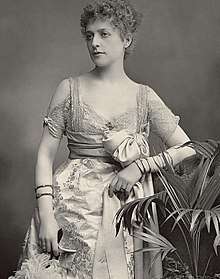Hope Temple
Hope Temple, born as Alice Maude (called "Dotie") Davis (27 December 1859 – 10 May 1938) was an Irish songwriter and composer. She was also known as Mrs André Messager.

Life
Alice Davis was born in Dublin, Ireland, and was known professionally as Hope Temple. She moved with her family to England aged 12 and began composing ballads at the age of 14. Initially she studied music with the idea of becoming a pianist, but an injury in a riding accident caused her to give up her ambitions. Her teachers in London included John Francis Barnett (piano) and Edouard Silas (harmony and counterpoint).[1] In the early 1890s she continued her studies in Paris with André Wormser and André Messager. In 1892, her operetta The Wooden Spoon was produced in London[2] (also in New York, 1893), but she was known primarily for her songs, some of which became very popular. Her song My Lady's Bower is sung by Molly Bloom in James Joyce's Ulysses.
In 1892, a reproduction of a photograph of her taken by Alex Bassano of Old Bond Street, London, was published in the Strand Magazine, as part of a series called "Types of English Beauty".[3]
In 1894, she assisted Messager in writing the opera Mirette, and then became his second wife in 1895.[4][5]
Hope Temple died in Folkestone, England.
Selected works
Stage
- The Wooden Spoon (1892)
- Mirette, opéra comique (1894), with Andre Messager, Fred E. Weatherly, Harry Greenbank and Adrian Ross[6]
Songs
- In Sweet September (Fred E. Weatherly), 1880
- Tis all that I can say (Thomas Hood), 1880
- She Walks in Beauty (Lord Byron), 1881
- An Old Garden (Helen Marion Burnside), c.1886
- My Lady's Bower (Fred E. Weatherly), 1887
- A Golden Argosy (Fred E. Weatherly), 1889
- Love and Friendship (John Muir), 1889
- Mary Grey (Clifton Bingham), 1890
- Rory Darlin' (Fred E. Weatherly), 1892
- Adieu l'amour / Love's Adieu (Catulle Blée), 1893
- Auf Wiederseh'n (Henry Wadsworth Longfellow), 1893
- Colin Deep (William Akerman), 1895
- The Garden of Dreams (Clifton Bingham), 1900
- Au bord des flots (Louis Fortolis), 1905
Piano music
- A Summer Dream (1895)
- A Night in Seville (c.1921)
References
- Axel Klein: "Temple, Hope", in: The Encyclopaedia of Music in Ireland, ed. H. White & B. Boydell (Dublin: UCD Press, 2013), p. 980–981.
- One-act operetta to a libretto by Gilbert Burgess, Trafalgar Square Theatre, 26 September 1892.
- The Strand Magazine, vol. 4, July–December 1892, p. 305.
- Coles, Clifton. "Gilbert and Sullivan Archive:Mirette Introduction". Retrieved 14 October 2010.
- Hubbard, William Lines; Andrews, George W.; Dickinson, Edward (1908). The American history and encyclopedia of music. I. Squire. p. 51. Retrieved 12 November 2010.
Hope Temple music.
- "Gilbert and Sullivan Archive:Mirette". Retrieved 14 October 2010.